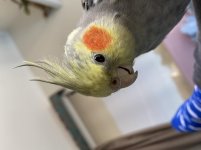I have a cockatiel chick that’s a bit over 3 weeks and very stunted (only just hitting 40 grams now). He was actually taken out of the nest due to stunting along with his little sibling, but the sibling died a few days later due to unknown reasons (had hard remnants at the bottom of the crop, bulging veins and weird head shaking all the time). Another chick (older) has also died in the nest earlier on for reasons unknown.
However, this current chick will not stop screaming! I’ve raised another clutch previously and never had a chick this bad! He will just screech at the top of his lungs constantly as if he’s absolutely starving, but he’ll do it all the time, even after being fed 10% of his body weight in formula (VetaFarm Neocare). He won’t sit still for a single second for me to feed him, runs around the room if I let him out for the feeds and tries to feed from literally everything in site, including the basket I put him in to weigh in, to the point I literally have to pry his beak off it to feed him.
I’ve tried looking these symptoms up but everything I find lists a serious of other symptoms he just doesn’t have. He’s certainly not lethargic, his droppings appear perfectly normal, he’s not vomiting and there’s no blood anywhere, and his crop usually empties very well (a bit slower recently though). His growth is incredibly slow, but I’ve been feeding him the 10% every 4 hours (when the crop appears empty enough) so not sure why he’s not growing. The only thing I could think of was some kind of fungal infection like avian gastric yeast, so I’ve been giving him Nystatin as well as some feeds with Gastrolyte to keep up the liquids.
Has anybody else had a chick like this? Any ideas how to get his growth back on track and his hunger under control?
However, this current chick will not stop screaming! I’ve raised another clutch previously and never had a chick this bad! He will just screech at the top of his lungs constantly as if he’s absolutely starving, but he’ll do it all the time, even after being fed 10% of his body weight in formula (VetaFarm Neocare). He won’t sit still for a single second for me to feed him, runs around the room if I let him out for the feeds and tries to feed from literally everything in site, including the basket I put him in to weigh in, to the point I literally have to pry his beak off it to feed him.
I’ve tried looking these symptoms up but everything I find lists a serious of other symptoms he just doesn’t have. He’s certainly not lethargic, his droppings appear perfectly normal, he’s not vomiting and there’s no blood anywhere, and his crop usually empties very well (a bit slower recently though). His growth is incredibly slow, but I’ve been feeding him the 10% every 4 hours (when the crop appears empty enough) so not sure why he’s not growing. The only thing I could think of was some kind of fungal infection like avian gastric yeast, so I’ve been giving him Nystatin as well as some feeds with Gastrolyte to keep up the liquids.
Has anybody else had a chick like this? Any ideas how to get his growth back on track and his hunger under control?
